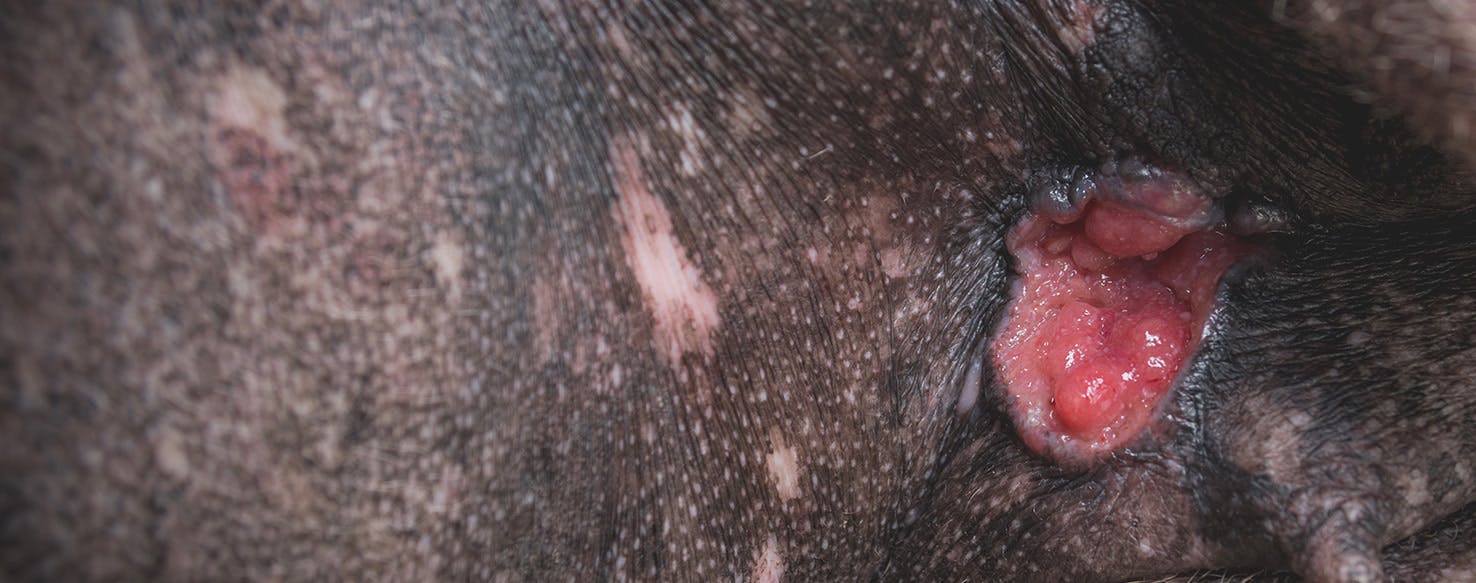
Save on pet insurance for your pet
You don't have to choose between your pet and your wallet when it comes to expensive vet visits. Prepare ahead of time for unexpected vet bills by finding the pawfect pet insurance.
You might be surprised to know just how many people have no idea that their dog can get skin cancer. The reality is that both dogs and cats are susceptible to skin cancer. The most common forms of skin cancer in dogs are the same as those humans tend to get, such as melanoma and squamous cell carcinoma.
Can Dogs Get Skin Cancer?
Your dog's skin is a lot like yours and is just as likely to come down with skin cancer. Keep an eye on your furry buddy's skin and just as you do for yourself, note any spots that were not there before. If you have any questions about lumps, marks, or lesions on your dog's body, consult the vet for a complete diagnosis.
Dogs with white coats are susceptible to skin cancer resulting from overexposure to the sun's UV rays. Short coated canines are at a higher risk than pooches with long thick coats of fur. In any case, limit your dog's exposure to the sun or use a form of canine sunscreen when you are spending time together outside.
Does My Dog Have Skin Cancer?
There are several reasons why your dog may be developing spots on the skin. Some of them can be simple discoloration, while others may be an indication of a more serious medical condition such as skin cancer.
The most common symptoms of canine skin cancer can typically be seen by the naked eye and may become more obvious as your dog ages. Bear in mind that the sooner you detect the cancer, the less your vet is going to have to do in the form of treatment.
Symptoms
-
Tumors on the skin, discoloration, lesions that are scaly or crusty
-
New growths on the skin, or changes in the color or size of any growths that were already there
-
Tumors that tend to bleed easily or that don’t seem to want to heal
-
Areas your dog seems to constantly lick
-
Swelling in breast tissues or discharge from nipples
-
Discoloration or lumps under the tail
Bumpy or wart-like growths
Colors may be red, pink, grey, black, and brown
-
Tissue or masses located in the mouth that seem different from the surrounding areas
Types
Melanoma
In humans, the most common cause of melanoma is over-exposure to the sun's UV rays. But veterinary experts are still undecided as to whether this is the cause of melanoma in dogs because this form of cancer can occur in areas that are not exposed to the sun, such as on the toes or in the mouth.
Squamous Cell Carcinoma
This form of skin cancer starts on the outer layer of the dog's skin and works its way in. It is a direct result of being exposed to UV radiation such as your dog might get if they spend too much time sunbathing.
Mast Cell Tumors
Mast cell tumors are considered to be the most common form of cutaneous tumors in dogs. Unfortunately, vets and medical experts are still not sure what causes it. There is some evidence that genetics, exposure to irritants, and inflammation may be partly to blame.
Diagnosis
To start with, your vet will go over your dog's history with you and then perform a complete physical examination. The vet may take a tissue sample from at least one of the tumors for lab analysis. Other tests may include:
-
Run a complete blood count (CBC)
-
Run a biochemistry profile
-
Run a urinalysis
-
Order x-rays to see if the cancer has spread to vital organs
To learn more about canine skin cancer, please visit our Condition Guides.
How Do I Treat My Dog's Skin Cancer?
The treatment will vary based on the particular form of skin cancer your dog has and how far advanced it is. The two most common treatments used to cure skin cancer in dogs are surgery and chemotherapy.
Surgery
The vet will sedate your dog and then surgically remove the tumor and some of the surrounding tissue to prevent it from recurring, as some forms of skin cancer can be quite aggressive. The most important thing to remember if your dog's tumors have been surgically removed is that you need to keep the wound sites clean until they heal. Be sure to keep your dog from scratching, licking, or biting the site.
Chemotherapy
Chemotherapy is another very common form of skin cancer treatment for dogs. Unlike humans, dogs seem to tolerate this type of treatment very well, with less than 5% requiring hospitalization. There are, however, reports of hair loss in some breeds. In the event your dog undergoes chemotherapy, they may feel a bit off for a day or two. However, since some of the chemicals may still be in your pup's system, you need to protect yourself by wearing gloves when handling bodily fluids and waste. Be sure to wash your hands any time you handle these fluids.
In either case, your dog should make a full recovery but should be monitored until they are back to normal. If the cancer has advanced, the prognosis will change. Your vet will discuss all probabilities with you.
Regular Checkups
Key to keeping your dog healthy and at their best are checkups as needed. If you see suspicious markings or lumps on your best buddy's body or skin, speak to the vet about it sooner rather than later.
You may also like
